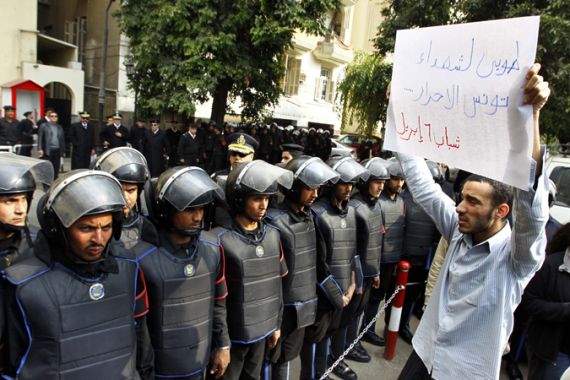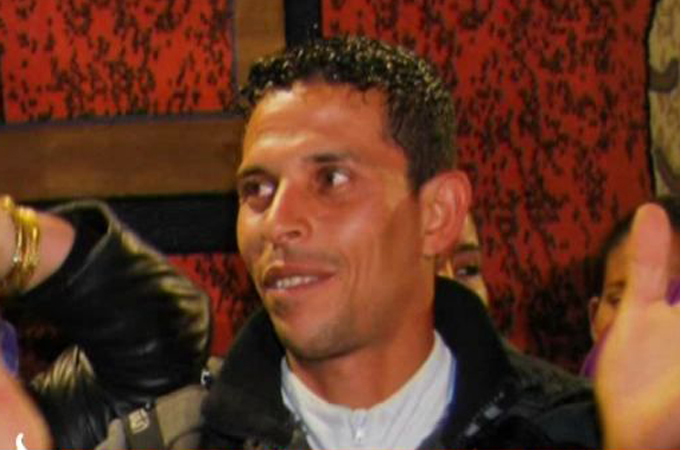Tunisia triggers copycat suicides
Acts of self-immolation spreads through North Africa and Middle East after suicide led to ouster of longtime president.

 |
| Mohamed Bouazizi set himself on fire in Sidi Bouzid, leading to protests that caused a countrywide uprising. |
The self-immolation that led to the toppling of Tunisia’s longtime leader, Zine El Abidine Ben Ali, has led to apparent copycat acts in other North African states and, for the first time, has spread to the Gulf.
A man in his sixties died on Friday after setting himself on fire in his house in Saudi Arabia, authorities there reported. It was reportedly the first case of self-immolation in the kingdom.
The man was from the southern Jizan province, on the border with Yemen, which has comparatively high unemployment rates, the Reuters news agency reported. A police spokesman said an investigation into his death was ongoing.
In addition to the Saudi man, five men have set themselves on fire in in Egypt, four in Algeria, and one in Mauritania.
Poverty, unemployment and frustration
Self-immolation as a form of protest is neither new (Buddhist monks did it to protest the Vietnam war) nor currently unique to north African countries (one 2005 study in Iran focused on 98 such cases in a five-year period in Tabriz alone, and multiple cases have been reported in Afghanistan ).
However, the succession of suicide attempts in the region and their root causes – poverty, frustration, lack of opportunities – seem to make them part of a disturbing trend.
In Egypt, two men set themselves ablaze on Tuesday – one died of his injuries – a day after another man lit himself on fire near the parliament building in Cairo.
In Algeria, where riots over the past few weeks have broken out in parallel to the unrest in Tunisia, newspapers have reported that at least four men had set themselves on fire in provincial towns in the last five days.
And in Mauritania’s capital, Nouakchott, police sources said Yacoub Ould Dahoud, 40, a company director and member of a wealthy family, staged a self-immolation protest on Monday against alleged government mistreatment of his tribe.
Witnesses said he doused himself in gasoline while sitting in his locked car in front of the presidential palace and set himself on fire. Security forces and passers-by broke the windows to remove him. He was sent to hospital with severe burns.
Bouazizi’s fatal example
Activists throughout the Arab world say they have been inspired by the example of Tunisia, the first country in generations where an Arab leader was toppled by public protests.
The Tunisian protests that brought down Ben Ali, who had been president for 23 years, erupted after the suicide of 26-year-old Mohammed Bouazizi, who set himself on fire on December 17 because police seized his grocery cart, saying he didn’t have the proper permit to sell produce.
Bouazizi died of his burns weeks later, becoming a martyr figure to the crowds of students and unemployed protesting against poor living conditions. Ben Ali had visited him in hospital, a gesture that failed to win him public sympathy.
‘Signs of social misery’
Algeria’s public suicide attempts – four in one week – have been the topic of debate in the country’s daily newspaper.
A man in his forties on Wednesday also set himself ablaze in Bordj Menaiel in the Boumerdes region near the Algerian capital, the Watan newspaper reported.
Desperate after being denied housing benefits, the father of six doused himself with gasoline and set himself alight, but a town official intervened to stop the fire, the newspaper said.
The man was hospitalised, but his life is not in danger, according to the report.
Another man, Senouci Touat, also used gasoline and set himself on fire in the city of Mostaganem, 350 km west of the capital, Algiers, El Watan and El Khabar newspapers reported. He too, survived.
Mohsen Bouterfif set himself ablaze on Thursday in Algeria’s Tebessa province, after a town’s mayor failed to secure him a house.
Newspapers said on Sunday he had died, but a government source later said he was alive at hospital and might survive.
The fourth incident took place in the town of Jijel, newspapers said.
“Billions of dollars have been invested in development programmes with no positive impact over the daily life of Algerian citizens,” El Watan editorialized.
“Signs of social misery are visible all over the country … Algeria’s street is rumbling. A hotbed of violence is very likely.”
A horrific final statement
Like Tunisians, many other Arabs are frustrated by soaring prices, poverty, high unemployment and systems of rule that ignore their voices.
In Egypt, authorities are adamant that there will be no large-scale unrest.
A security source said that the man who lit himself on fire on Monday, Abdouh Abdel Moneim, who is reportedly in his fifties, suffered light injuries because parliamentary security quickly put out the flames.
“The man was frustrated because he could not get his ration coupons from Ismailiya (east of Cairo) to buy subsidised goods. He came to parliament to find someone to help him,” the source said.
The local mayor said the man had a history of mental illness, but Ayman Nour, a leading opposition politician, said Abdel Moneim had been troubled by economic conditions.
“Definitely, definitely, definitely,” said Nour when asked if there was a link between the incident and the events in Tunisia.
“Security is leaning in the direction of making him out to be psychologically ill. I want to say that Egypt is full of psychologically troubled people because of what happens here,” Nour said.
“Tunisia is now the model to follow for all Arabs. The time for dictators and dictatorships is over,” said Mohamed Lagab, political analyst and teacher of political science at Algiers university.